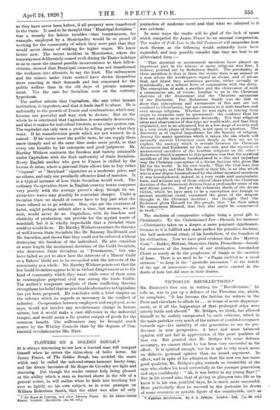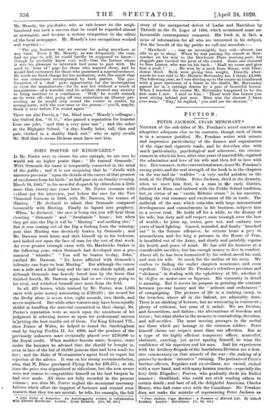VICTORIAN RECOLLECTIONS.*
MR. BRIDGES'S first aim in writing his " Recollections," he tells us, was to put up a defence of the Victorian era, which, he complains, " it has become the fashion for writers in the Press and elsewhere to allude to ... in terms of acute disparage- ment, as if all the happenings of that prolonged reign were utterly futile and absurd." Mr. Bridges, we think, has allowed himself to be unduly exasperated by such criticism, which in the main partakes very much of the nature of youthful arrogance towards age—the inability of one generation to see its pre- decessor in true perspective. A later and more balanced opinion will not fail in appreciation of the great qualities of that era. But granted that Mr. Bridges felt some defence necessary, we cannot think he has been very successful in his effort. It is spirited enough, but he is apt to rely much more on didactic personal opinion than on sound argument. In effect, and in spite of his admission that the new era has some good qualities, Mr. Bridges's plea reminds us irresistibly of the sage who shakes his head sorrowfully at the younger generation and says confidently : " .Ah, it was better in my young days I But in his second aim, that of giving us glimpses into life as he knew it in his own youthful days, he is much more successful. More particularly does he succeed in the portraits he draws of some eccentric or notable figure of the countryside, such as • Victorian Recolketiont. By J. A. Bridges. Loudon : Bell. 17s. ed. neLl Mr. Measdy, the pig-dealer, who as tale-bearer to the neigh- bourhood was such a success that he could be regarded almost as newsagent, and became a serious competitor to the editor of the local newspaper. Mr. Measdy's two occupations worked well together :- " The pig business was an excuse for going anywhere at any time. Even if Mr. Measdy, as was frequently the case, had no pigs to sell, he could hardly be supposed to know— though he probably knew very well—that the farmer whom it was his pleasure to interview had none to part with. He used to hear of ' pigs for those who wanted them, and he would find customers for those who possessed a superabundance. He made no fixed charge for his mediation, with the result that he was sometimes recompensed by both parties. The pro- longation of a `deal' ga se opportunity for the investigation or even the manufacture—for he was not without a touch of imagination—of a scandal, and he seldom showed any anxiety to bring matters to a conclusion. ' Well,' he would remark as he went off—this going off was sometimes an illusory pro- ceeding, as he would stop round the corner to confer, by arrangement, with the cow-man or the groom—' you'll, maybe, think it over before I'm round again."
There are also Purvis, a " fat, blind man," Measdy's colleague ; the Oxford don, " 0. G.," who gained a reputation for humour from one joke, " and that a very poor one " ; and the usher at the Highgate School, " a shy, kindly helot, tall, thin and pale, clothed in a shabby black suit," who so aptly recalls Mr. Moll that it seems Dickens must have met him.



































 Previous page
Previous page